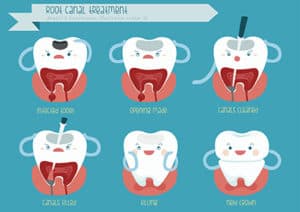Understanding Root Canal Procedures and Crowns: Can They Be Combined?
Root canals often evoke anxiety and fear, fueled by their portrayal in popular culture as a painful dental procedure. However, misconceptions surround them, leading to misunderstandings. One common query is whether a root canal can be performed through an existing dental crown. This issue is complex yet intriguing. Let’s delve deeper into this topic to clarify doubts and provide insights.
What is a Root Canal?
When a tooth becomes damaged or infected, it can affect the nerves inside it. If the infection becomes severe, a dentist may suggest a root canal. This involves removing the damaged portions of the tooth, including the nerves and blood vessels, and replacing them with a rubbery material called gutta-percha. A crown is then placed on the tooth and sealed. After a relatively short recovery period, the root canal tooth functions just like a natural tooth.
Despite all the bad press, a root canal is a routine dental procedure in most cases. Complications are rare, and most patients do not experience serious discomfort. While each situation is unique and your dentist can give you more personalized advice, in general, there’s nothing to fear.
Can a Root Canal Be Done Through an Existing Crown?
So, can a root canal be done through an existing crown? Sometimes the answer is yes. In those cases, the procedure is performed just like a standard root canal, with the damaged tissue being removed and the drilled hole sealed. However, there are exceptions:
-
Advanced Damage or Decay:
- If the damage or decay that necessitated the root canal is too advanced, a new crown may be required.
-
Crown Damage:
- If the crown itself is damaged during the procedure, such as when a large piece of porcelain breaks off, the crown may be beyond repair.
-
Additional Tooth Damage:
- If further damage to the tooth is discovered during the root canal, such as a root fracture, the tooth may need to be extracted.
In these cases, your dentist will select the appropriate course of action for your individual case. Unless the tooth is so badly damaged that extraction is necessary, most of the time the root canal will take place as planned, and your dentist will simply replace the old crown with a new one. This adds some time and expense to the procedure, but as with most root canals, it’s generally free of complications or undue patient discomfort. Your dentist will give you personalized guidance about your own situation.
Benefits of Root Canal and Crown Procedures
Root canals sound scary, but they let you preserve your smile and your teeth for years to come. Crowns provide protection and restore function to the tooth, making them a crucial part of the treatment.
At Plage Dentistry, we work to ensure our patients enjoy a lifetime of dental health and wellness. Get in touch today and make an appointment so we can help you with your oral care needs.
